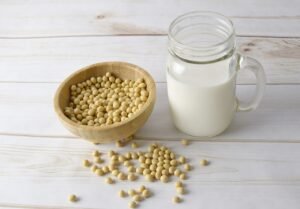The Risks and Rewards of Eating Soy

Soy is a popular food that has been consumed for centuries. It is widely regarded as a beneficial source of nutrition and is often used as a meat substitute for vegetarians and vegans. Yet, despite its ubiquity and reputation as a “superfood”, there is a debate on whether or not soy is actually good for you.
In many aspects, soy is indeed beneficial. It is an especially good source of plant-based protein, with a single cup of cooked soybeans containing almost 30g of protein. Additionally, soy provides an abundance of vitamins and minerals including magnesium, folate, and iron. Furthermore, soybeans have an assortment of phytochemicals which can reduce the risk of certain cancers, including breast and prostate cancer.
However, any potential benefits of soy come with a few caveats. For one, the majority of soy produced today is genetically modified. Genetically modified organisms (GMOs) have not been studied for long-term health effects, and many GMOs have been linked to various diseases. In addition, many of the positive health claims related to soy are disputed by researchers. For instance, soy has been repeatedly linked to an increased risk of breast cancer, despite claims that it has antioxidant and other protective effects. Furthermore, soy contains isoflavones which act as phytoestrogens, and high intakes of phytoestrogens can disrupt hormone levels in the body. An excessive intake of isoflavones is associated with impaired fertility, as well as hormone-related cancers.
When deciding whether or not soy is good for you, there are several variables to consider. Those with a family history of hormone-related cancer may wish to avoid soy entirely. People who have had any type of hormone-related surgery should also avoid soy, as the phytoestrogens contained in soy can be dangerous for hormone-sensitive diseases. Vegetarians and vegans, who rely on soy-based products for their protein needs, should limit their consumption and opt to buy organic, non-GMO soy whenever possible. For everyone else, moderate consumption of soy products can provide a myriad of potential health benefits.
Overall, the debate about whether or not soy is good for you is ongoing. Despite its potential benefits, there are a number of risks associated with soy, particularly with regards to hormones and GMOs. Thus, it’s important to weigh both the pros and cons before deciding how much soy to consume. For most people, enjoying soy occasionally within a balanced diet can provide numerous benefits.

Comments